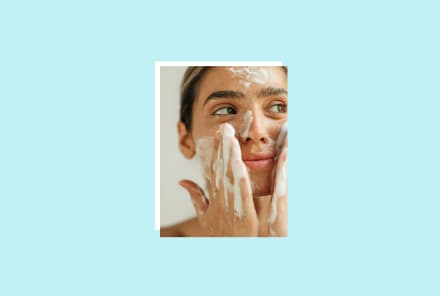Advertisement
If You Have Dry, Irritated Skin, Try These 5 Research-Backed Ingredients


If you've ever gone through a period in which your skin was particularly dry and dehydrated, you know just how uncomfortable it can be. Dry skin is never just dry skin: It comes with flakes, ashiness, itchiness, blotchiness, irritation, sensitivities, and tightness. It can even lead to more severe inflammatory skin conditions, such as eczema, rosacea, and psoriasis. Not ideal, to say the least.
So when dry skin creeps up on you, take it seriously: Grab yourself a soothing, deeply hydrating lotion that helps restore the skin barrier, limit transepidermal water loss, and provide comforting production.
Here are the best natural ingredients to keep an eye out for when dealing with parched, dry skin—derm and research-approved.
Oat extracts
Oat extracts—and more specifically colloidal oat—are the gold standard ingredient for dry, sensitive skin. Oats are anti-inflammatory in their own right, as they contain antioxidants, lipids, and avenanthramides.
When boiled down, it makes colloidal gel extract, which is rich in antioxidants and has a 30% concentration of lipids. This substance has been shown to bolster the skin barrier1, provide protective qualities2 against external stress, and act as an emollient. The FDA has even approved colloidal oatmeal as an over-the-counter drug, specifically as a skin protectant.
But it's not the only oat extract to keep an eye out for. Oat oil is also wonderful for dry, itchy skin. Not only is it lipid- and antioxidant-rich, but it's even shown to upregulate ceramide production3 in the skin.
Aloe vera
Aloe vera is a major skin thirst quencher. Not only does it have high water content naturally, but it also acts as a humectant. Humectants attract water, pulling it into the epidermis. When applied topically, aloe vera has been shown to increase the water content4.
It's also highly soothing (there's a reason it's used to treat sunburns!). Because of its naturally moisturizing, and subsequently healing, properties, research has shown that aloe vera may help heal5 irritation and inflammation in the skin. Some research has found that aloin6, a compound found in the aloe plant, has anti-inflammatory properties that aid in the skin-healing process.
Shea butter
This botanical butter is one of the most popular ingredients in creams and lotions for good reason. Its moisturizing and emollient qualities are tied to the high fatty-acid content, namely linoleic acid and oleic acid. These fatty acids sink into the skin and help restore the barrier7. One study even suggests it has similar topical effects to ceramides8.
Shea butter extract has also been shown to be anti-inflammatory9, in large part due to its skin-barrier-protecting properties but also because it's notably high in vitamin E, a potent and oil-soluble antioxidant that can help fight free-radical damage and oxidative stress.
Coenzyme Q10
Coenzyme Q10 (CoQ10) is a fat-soluble antioxidant that's found in all your cells. Furthermore, it's the only fat-soluble antioxidant10 naturally made by the human body. And this antioxidant is special.
It protects against lipid peroxidation11, a process by which free radicals damage cell membranes. Not only that, but it protects the membranes of mitochondria and regenerates other antioxidants, like vitamins C and E—both of which are just as important for healthy skin.
Squalane
Squalene is a natural lipid produced by your skin, and it plays several functions in the skin—including barrier protection, limiting transepidermal water loss, and more. We have a more abundant supply when we're young, but we lose it with age. Dry skin, increased sensitivities, irritation, and premature aging can all be traced back to its loss.
Well, this ingredient can actually be extracted from botanical sources, such as olive oil, sugar cane, and soy. When applied topically, it can reduce irritation by replenishing your natural supply—helping the skin barrier protect itself.
The takeaway
Dry, irritated skin can be a nuisance—but with the right topical ingredients, applied daily, you can support your skin barrier health. This will help keep your skin moisturized, reduce irritation, manage inflammation, and decrease the appearance of flakes, fine lines, and so on.
11 Sources
- https://www.ncbi.nlm.nih.gov/pubmed/25607907
- https://www.ncbi.nlm.nih.gov/pmc/articles/PMC5465813/
- https://pubmed.ncbi.nlm.nih.gov/25651930/
- https://www.ncbi.nlm.nih.gov/pubmed/17026654
- https://www.ncbi.nlm.nih.gov/books/NBK74820/
- https://www.ncbi.nlm.nih.gov/pmc/articles/PMC6017010/
- https://www.ncbi.nlm.nih.gov/pmc/articles/PMC5796020/
- https://www.ncbi.nlm.nih.gov/pubmed/26314567
- https://www.ncbi.nlm.nih.gov/pubmed/22499721/
- https://www.ncbi.nlm.nih.gov/pmc/articles/PMC3178961/
- https://www.ncbi.nlm.nih.gov/pmc/articles/PMC5514578/
Watch Next
Enjoy some of our favorite clips from classes
Enjoy some of our favorite clips from classes
What Is Meditation?
Mindfulness/Spirituality | Light Watkins
Box Breathing
Mindfulness/Spirituality | Gwen Dittmar
What Breathwork Can Address
Mindfulness/Spirituality | Gwen Dittmar
The 8 Limbs of Yoga - What is Asana?
Yoga | Caley Alyssa
Two Standing Postures to Open Up Tight Hips
Yoga | Caley Alyssa
How Plants Can Optimize Athletic Performance
Nutrition | Rich Roll
What to Eat Before a Workout
Nutrition | Rich Roll
How Ayurveda Helps Us Navigate Modern Life
Nutrition | Sahara Rose
Messages About Love & Relationships
Love & Relationships | Esther Perel
Love Languages
Love & Relationships | Esther Perel
-v1646695196476.jpg?1148x800)


















